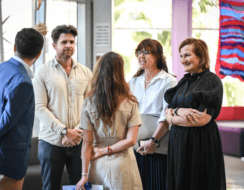01 Sep 2022
OpinionFrom the CEO: Why CALD communities and organisations must support an Indigenous Voice to Parliament
Prime Minister Albanese has released a draft, simple form of words that could be put to Australians in a referendum, paving the way for First Nations people to take a rightful place in their own country.
Culturally and linguistically diverse (CALD) communities have an important role to play in supporting this proposal and elevating understanding of the challenges facing community members whose voices are often invisible to mainstream Australia.
There are many synergies between the First Nations and the migrant/refugee experience.
The sense of connection to their land of birth is important to those who leave their homelands to come to Australia – many arriving with a rich cultural and spiritual legacy and deep connections with the land.
Migrants and refugees can also relate to issues of land loss, trauma and being torn away from their people and traditional ways of life.
Those we work with, and many who work for multicultural community organisations, know firsthand what it is like to feel as though they don’t belong.
I’ve seen this in my work in CALD organisations, and in my own family, where many family members struggled to build a connection to mainstream Australia after migrating here from Greece after the second world war.
It is heart-breaking to be misunderstood or discriminated against simply because of difference. Whether that is difference of language, difference of customs, different spiritual beliefs, or different skin colour. We all benefit when our differences are recognised and celebrated. Sense of belonging grows when we are treated equally.
A key role of organisations working in the multicultural space, like Settlement Services International, is to welcome people from all over the world to our country.
We welcome them to a place where First Nations people have had a continuous connection to the land for more than 60,000 years, contributing culture, wisdom and care for the land that has not always been acknowledged, respected or considered.
But we reached a point in time where many of our First Nations people often don’t feel welcomed in their own land.
It is something that cuts to the heart of the experiences of multicultural communities too, where individuals and families often feel cutoff from the mainstream, despite making significant cultural, social and economic contributions to their new homes.
I acknowledge that discussions of constitutional matters can seem complex, and the debate might seem confusing or perhaps even not very relevant to migrants or new Australians who have their own issues to deal with.
However, to use the words of Prime Minister Albanese, it really boils down to ‘common decency, common courtesy and common sense’.
As he says, when governments listen to people, their policies can be more effective. Just as we want politicians to listen to CALD communities from hundreds of different backgrounds, and to understand their needs so that they may live a life where they can achieve their full potential, so we should ask it for First Nations people. It’s the right and decent thing to do.
What can we in the community services sector do then to help support this momentous opportunity for positive change?
Individually, we can reach out to First Nations people and organisations in our local area to better educate ourselves about Aboriginal culture and history. We can incorporate their voice in the work we do, and ensure we engage and hear from them often.
We can recognise that just as the newcomers we work for are from a variety of different nations, First Nations people in this country are from various countries with different customs and protocols. We need to make sure our consultations are place based and incorporate the appropriate cultural awareness.
Each day we can play our part in creating culturally safe places for First Nations people, whether at work or in community.
We can learn more about the Uluru Statement of the Heart and the Indigenous Voice to Parliament and talk to our family and friends about it, so that when the time comes, we can support the referendum.
CALD organisations are uniquely positioned to help educate new arrivals and create allies to the cause.
We can do this by incorporating recognition of First Nations people into our service delivery and encouraging respect and curiosity about the world’s oldest living culture.
CALD groups can support reconciliation by creating a First Nations voice in everything they do, as we are committed to doing at SSI.
SSI fully supports the recommendations made in the Uluru Statement of the Heart and we will play our part in supporting a yes vote in a referendum.
I urge you to join us. It’s time, Australia.


